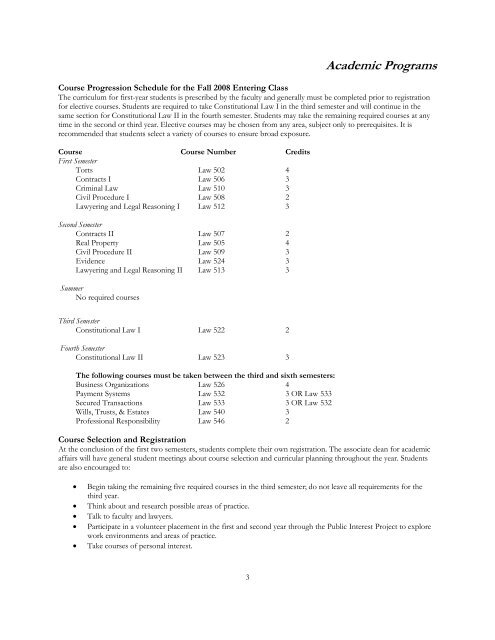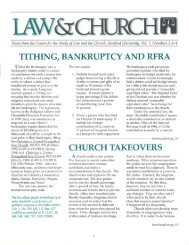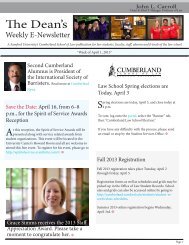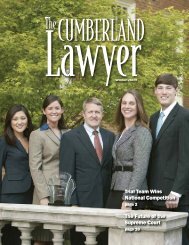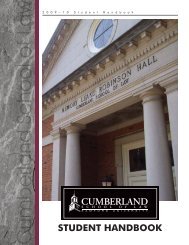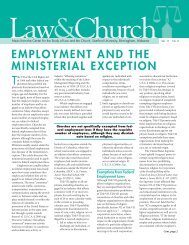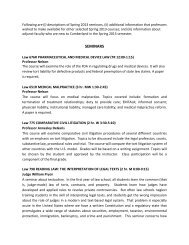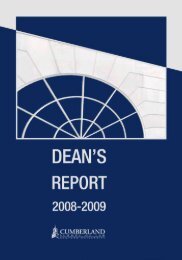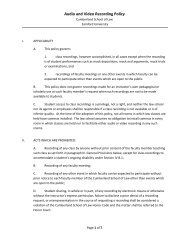student handbook - Cumberland School of Law - Samford University
student handbook - Cumberland School of Law - Samford University
student handbook - Cumberland School of Law - Samford University
You also want an ePaper? Increase the reach of your titles
YUMPU automatically turns print PDFs into web optimized ePapers that Google loves.
3<br />
Academic Programs<br />
Course Progression Schedule for the Fall 2008 Entering Class<br />
The curriculum for first-year <strong>student</strong>s is prescribed by the faculty and generally must be completed prior to registration<br />
for elective courses. Students are required to take Constitutional <strong>Law</strong> I in the third semester and will continue in the<br />
same section for Constitutional <strong>Law</strong> II in the fourth semester. Students may take the remaining required courses at any<br />
time in the second or third year. Elective courses may be chosen from any area, subject only to prerequisites. It is<br />
recommended that <strong>student</strong>s select a variety <strong>of</strong> courses to ensure broad exposure.<br />
Course Course Number Credits<br />
First Semester<br />
Torts <strong>Law</strong> 502 4<br />
Contracts I <strong>Law</strong> 506 3<br />
Criminal <strong>Law</strong> <strong>Law</strong> 510 3<br />
Civil Procedure I <strong>Law</strong> 508 2<br />
<strong>Law</strong>yering and Legal Reasoning I <strong>Law</strong> 512 3<br />
Second Semester<br />
Contracts II <strong>Law</strong> 507 2<br />
Real Property <strong>Law</strong> 505 4<br />
Civil Procedure II <strong>Law</strong> 509 3<br />
Evidence <strong>Law</strong> 524 3<br />
<strong>Law</strong>yering and Legal Reasoning II <strong>Law</strong> 513 3<br />
Summer<br />
No required courses<br />
Third Semester<br />
Constitutional <strong>Law</strong> I <strong>Law</strong> 522 2<br />
Fourth Semester<br />
Constitutional <strong>Law</strong> II <strong>Law</strong> 523 3<br />
The following courses must be taken between the third and sixth semesters:<br />
Business Organizations <strong>Law</strong> 526 4<br />
Payment Systems <strong>Law</strong> 532 3 OR <strong>Law</strong> 533<br />
Secured Transactions <strong>Law</strong> 533 3 OR <strong>Law</strong> 532<br />
Wills, Trusts, & Estates <strong>Law</strong> 540 3<br />
Pr<strong>of</strong>essional Responsibility <strong>Law</strong> 546 2<br />
Course Selection and Registration<br />
At the conclusion <strong>of</strong> the first two semesters, <strong>student</strong>s complete their own registration. The associate dean for academic<br />
affairs will have general <strong>student</strong> meetings about course selection and curricular planning throughout the year. Students<br />
are also encouraged to:<br />
• Begin taking the remaining five required courses in the third semester; do not leave all requirements for the<br />
third year.<br />
• Think about and research possible areas <strong>of</strong> practice.<br />
• Talk to faculty and lawyers.<br />
• Participate in a volunteer placement in the first and second year through the Public Interest Project to explore<br />
work environments and areas <strong>of</strong> practice.<br />
• Take courses <strong>of</strong> personal interest.


